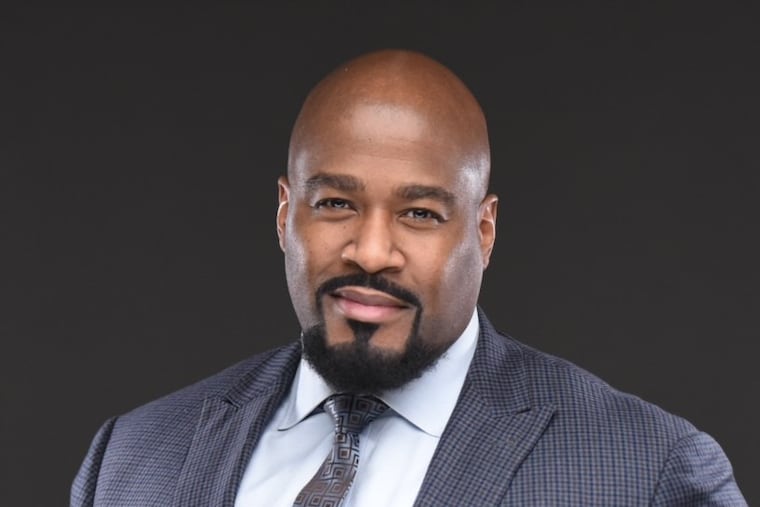African American Chamber of Commerce’s Donavan West on his members’ suffering amid Floyd protests
"Right now it’s extremely stressful for business owners. Imagine you’re of a minority who survives COVID, only for your business to be decimated by the rash of looting taking place in business corridors."

“I’m not OK.”
So wrote Donavan West in a letter to African American Chamber of Commerce members this past week.
As the president and CEO of the African American Chamber of Commerce of Pennsylvania, New Jersey, and Delaware, West is tending to a struggling group of about 600 members and business owners, helping them rebuild from the coronavirus pandemic. Then he wrote an impassioned, personal note to his circle, on which he elaborated with The Inquirer.
West, 45, was named president of the chamber in October 2019. He was the longtime chief operating officer of People for People, founded by his mentor Herb Lusk, a Philadelphia pastor and former Eagles running back.
But West felt personally motivated to speak out on behalf of black-owned business owners until the coronavirus and the murder of George Floyd in Minneapolis.
» READ MORE: From Wednesday: The Rizzo statue comes down
First, he wrote out of anguish. Like many in his community, “I saw myself in those cuffs, on the ground with three officers squeezing the life out of me as I pleaded for air and asked for my mother in my final moments. While I am the president of the African American Chamber of Commerce, I proactively engage with literally every race in an effort to identify common challenges and interests so that we can leverage new partnerships toward bigger impacts for the small business communities,” he wrote. “I and countless others have to adjust our mental and spiritual energy so that we can successfully balance what we’re going through while continuing to contribute in meaningful ways. It’s not easy.”
West, a graduate of Penn State who has a master’s from Eastern University, said he got an eerie feeling “seeing George Floyd, who’s only a few months older than me, and an inch taller. It was like watching myself die, watching my twin die, at the hands of the cops,” he said.
As for his business members, “Right now, it’s extremely stressful for business owners. Imagine you’re of a minority who survives COVID, only for your business to be decimated by the rash of looting taking place in business corridors.”
Black business owners
The AACC currently has a mix of self-employed, micro-entrepreneurs, small-business, retail, food service, construction, and about 20 corporate members. About 60% of members suffered financial damage from COVID, and as to damage from looting, “we’re still doing call-ins. Right now we’re a low percentage of those impacted.”
Areas or sectors that were hardest hit include such corridors as West Philly, especially 52nd Street and Parkside; 77th and City Avenue; 48th and Girard; 57th and Vine; and Lebanon Road.
He mentioned ShopRite, in particular, as an “essential business that offers second-chance employment. Those have also been decimated.”
What is the chamber doing? “We assist with applying for grants that will be made available in historically disadvantaged neighborhoods,” an estimated $112 million or so expected, West said.
Members of the African American Chamber “are extremely supportive of the protesters and understand the core issue,” he wrote. The issue is disproportionate exposure to all the negative elements of life and criminal justice, health infrastructure, and job infrastructure, West explained.
“The cost of doing business as a person of color is totally different than white business owners.”
That said, “We are in full support of peaceful protest. The majority of what’s happening with violence and looting is strategic and foreign.”
Most black business owners aren’t swayed from the cause by the subsequent rioting, he said.
“They’re victims of the effects. There are thousands of people participating in peaceful protest. It was safe, and then other people who participated in riots. That’s different from a demonstration and protest.”
He’s glad the cameras are rolling. “Thank God for the digital age.”
He also wrote that while his members are losing their livelihoods, “I also have to be reminded that I am not able to:
“Talk to a white woman about her dog without fear of incarceration (Christian Cooper).
“Jog and check out a house under construction like everyone without fear of being hunted and killed (Ahmaud Arbery).
“Sleep in my house without fear that I’ll be killed (Breonna Taylor).
“Be detained by the cops without fear of losing my life (George Floyd).”
What needs to happen next, he wrote:
“BELIEVE: We have to believe that change is actually possible.
“PRAY: We have to pray that our emotions don’t get the best of us and we fall into self-sabotaging behavior.
“DEMAND: We have to demand criminal justice reform from our elected officials. This includes overhauling our police departments; assessing current leadership for competency; assessing all police departments for cultural diversity and sensitivity; facilitating sensitivity training; terminating and prosecuting bad cops.
“VOTE: Participate in the voting process at every level. If we don’t see ourselves represented, participate in the process of developing and supporting future candidates but we must do our job and vote for the best candidate now.
“BE COUNTED: Participate in the 2020 U.S. Census. We don’t count until we’re counted. Representation does impact the amount of money that comes to the state to support everything from child care and workforce development to our roads and bridges.
“BUY: Support local business. We have to support businesses that support us. If you don’t see the pain our people are going through, why should you see our dollars.”